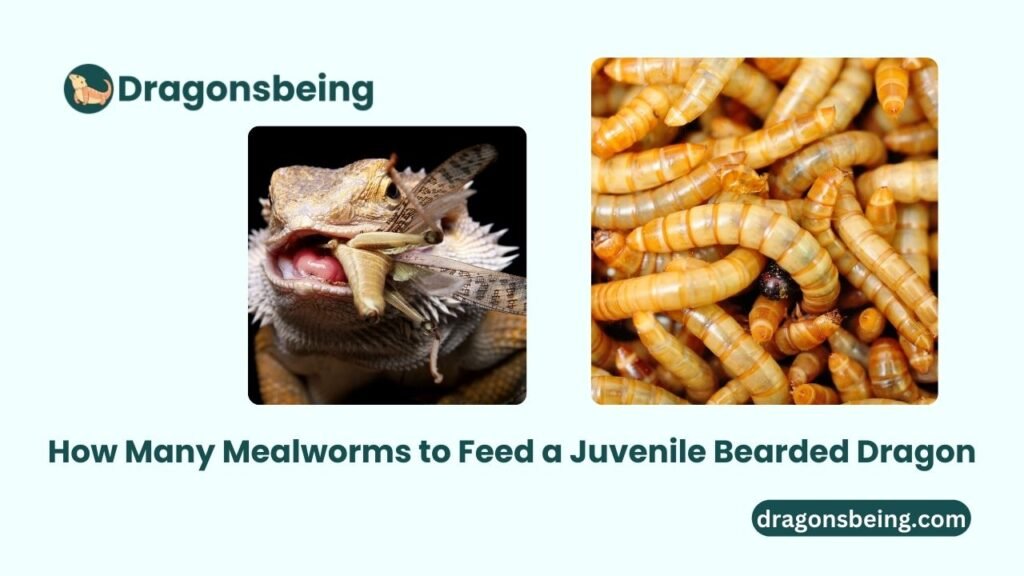Feed a juvenile bearded dragon 10 to 20 mealworms per feeding, depending on its size and appetite. Offer them two to three times a week to ensure a balanced diet.
Juvenile bearded dragons require a nutrient-rich diet for healthy growth. Mealworms can be an excellent protein source, but moderation is essential. Young dragons are more active and need a variety of foods to thrive. Along with mealworms, include leafy greens and vegetables for balanced nutrition.
Proper feeding habits set the foundation for a healthy adult dragon. Overfeeding can lead to obesity, so always monitor your pet’s eating habits. Understanding their dietary needs will help you provide a happy, thriving environment for your bearded dragon. Aim for diversity in their diet to support overall well-being.
Introduction To Juvenile Bearded Dragon Dietary Needs
Feeding a juvenile bearded dragon properly is crucial. These young reptiles have unique dietary needs. A balanced diet helps them grow strong and healthy. Understanding their nutritional requirements is vital for their development.
Importance Of A Balanced Diet
A balanced diet is key for juvenile bearded dragons. It supports growth, energy, and overall health. Here are some reasons why a balanced diet matters:
- Promotes healthy bone growth
- Boosts immune system function
- Enhances color and vitality
- Prevents obesity and related health issues
Growth Phase Nutritional Requirements
Juvenile bearded dragons require specific nutrients during their growth phase. Their diet should consist of:
| Nutrient | Recommended Amount |
|---|---|
| Protein | 40% of total diet |
| Vegetables | 50% of total diet |
| Calcium | Supplement as needed |
| Vitamins | Supplement as needed |
Mealworms can be a great protein source. However, they should not be the only food. Aim to provide a variety of insects and vegetables. Here’s a quick list:
- Crickets
- Dubia roaches
- Leafy greens
- Squash and bell peppers
Feeding frequency is also important. Offer food at least twice a day. Monitor their weight and adjust portions accordingly. This ensures your juvenile bearded dragon thrives.
Mealworms As A Dietary Staple
Mealworms are a popular choice for feeding juvenile bearded dragons. They provide essential nutrients and are easy to find. Understanding their nutritional value helps ensure your dragon thrives.
Nutritional Value Of Mealworms
Mealworms offer a balanced diet for growing reptiles. They contain protein, fat, and essential vitamins. Here’s a breakdown of their nutritional content:
| Nutrient | Amount per 100g |
|---|---|
| Protein | 20-25g |
| Fat | 14-15g |
| Fiber | 3-4g |
| Calcium | 0.02g |
| Phosphorus | 0.04g |
High protein content supports growth. Healthy fats provide energy. Mealworms also contain fiber for digestion.
Benefits And Limitations
Feeding mealworms has both benefits and limitations. Knowing these helps you make informed decisions.
- Benefits:
- Easy to digest for juvenile dragons.
- High protein aids in muscle development.
- Readily available in pet stores.
- Limitations:
- High fat content can lead to obesity.
- Not a complete diet on their own.
- May cause impaction if fed in excess.
Balance is key. Combine mealworms with greens and vegetables for variety. Monitor your bearded dragon’s health closely.
Determining The Right Quantity
Feeding juvenile bearded dragons requires careful attention. The right amount of mealworms is crucial for their growth. Too many or too few can affect their health.
Factors Affecting Mealworm Intake
Several factors influence how many mealworms your juvenile bearded dragon needs. Here are some key considerations:
- Age: Younger dragons need more food.
- Size: Larger dragons require more mealworms.
- Activity Level: Active dragons need more calories.
- Diet Variety: A mixed diet can reduce mealworm intake.
Use the following table as a guideline:
| Age | Mealworms per Day |
|---|---|
| Juvenile (0-6 months) | 10-20 |
| Sub-adult (6-12 months) | 5-15 |
Signs Of Overfeeding And Underfeeding
Recognizing signs of overfeeding and underfeeding is essential.
Signs of Overfeeding:
- Obesity or excessive weight gain
- Fatigue or lethargy
- Stomach swelling
- Refusal to eat
Signs of Underfeeding:
- Weight loss
- Sunken eyes
- Poor skin quality
- Active searching for food
Monitoring your dragon’s behavior helps maintain their health. Adjust mealworm quantities as needed.
Feeding Frequency And Schedule
Feeding frequency and schedule are vital for juvenile bearded dragons. Proper routines ensure healthy growth and energy. Mealworms are a popular choice. Knowing how often to feed them is key.
Daily Feeding Routines
Juvenile bearded dragons need regular meals. A daily feeding routine helps maintain their health. Here’s a simple guide:
| Age | Feeding Frequency | Mealworms per Feeding |
|---|---|---|
| 6-12 weeks | 3 times a day | 10-15 mealworms |
| 3-6 months | 2 times a day | 15-20 mealworms |
| 6-12 months | 1-2 times a day | 20-30 mealworms |
Adjust the number of mealworms based on your dragon’s appetite. Always monitor their weight and health.
Adjusting Feeding Times
Feeding times can be adjusted based on your schedule. Keep a consistent routine. Here are some tips:
- Feed in the morning for energy.
- Provide a second meal in the afternoon.
- Consider an evening feeding for older dragons.
Watch your dragon’s behavior. If they seem hungry, you may need to feed more. Always provide fresh water. Avoid overfeeding to prevent health issues.
Remember, every dragon is unique. Adjust the plan based on your dragon’s needs.
Preparing Mealworms For Feeding
Feeding mealworms to your juvenile bearded dragon is vital. Proper preparation ensures they receive the best nutrition. This section covers safe handling, storage, and ways to enhance the nutritional value of mealworms.
Safe Handling And Storage
Handling mealworms safely is essential for your pet’s health. Here are some important tips:
- Always wash your hands before and after handling.
- Use clean utensils to avoid contamination.
- Store mealworms in a cool, dry place.
- Keep them in a breathable container.
Mealworms require proper care. Follow these storage guidelines:
| Storage Method | Temperature | Duration |
|---|---|---|
| Refrigeration | 40°F (4°C) | Up to 2 weeks |
| Room Temperature | 70-80°F (21-27°C) | Up to 1 week |
Enhancing Nutritional Value
Boosting the nutritional content of mealworms is beneficial. Here are some effective ways:
- Gut-loading: Feed mealworms nutritious food 24 hours before feeding them to your dragon.
- Calcium dust: Sprinkle mealworms with calcium powder.
- Vitamin supplements: Use reptile vitamins to enhance their diet.
Choosing the right foods for gut-loading is vital. Consider using:
- Leafy greens
- Carrots
- Oats
These methods ensure your juvenile bearded dragon gets the best nutrition.
Monitoring Your Bearded Dragon’s Health
Monitoring your bearded dragon’s health is crucial. Proper care helps them grow strong. Regular checks can prevent health issues.
Pay attention to their diet. Mealworms are a popular choice. Knowing how many to feed is essential.
Weight And Growth Tracking
Weight and growth tracking is vital for young dragons. Here’s how to do it:
- Weigh your bearded dragon weekly.
- Keep a log of their weight.
- Monitor growth every month.
Use the following table as a guide for weight:
| Age (Months) | Average Weight (grams) |
|---|---|
| 0-1 | 5-10 |
| 1-2 | 15-25 |
| 2-3 | 30-50 |
| 3-4 | 60-100 |
Consistent weight checks help ensure they thrive.
Identifying Dietary Reactions
Be aware of how your bearded dragon reacts to mealworms. Watch for these signs:
- Change in appetite.
- Loose stools or diarrhea.
- Weight loss or gain.
Adjust their diet based on these reactions:
- Decrease mealworm servings if they show discomfort.
- Introduce other insects like crickets.
- Consult a vet for persistent issues.
Healthy dragons are active and curious. Regular monitoring supports their well-being.
Supplementing Mealworms With A Varied Diet
Feeding a juvenile bearded dragon requires careful planning. Mealworms are a good protein source. However, a varied diet is essential for overall health. This diet helps in proper growth and development. It also prevents nutritional deficiencies.
Incorporating Fruits And Vegetables
Fruits and vegetables offer vital nutrients. They provide fiber, vitamins, and minerals. Here are some suitable options:
- Leafy greens: kale, collard greens
- Fruits: strawberries, blueberries
- Vegetables: bell peppers, squash
Chop these into small pieces. This makes it easier for your dragon to eat. Offer these fresh and avoid canned options. Always wash them to remove pesticides.
The Role Of Supplements
Supplements are important for a balanced diet. They help meet nutritional needs. Consider these key supplements:
| Supplement | Purpose |
|---|---|
| Calcium Powder | Supports bone health |
| Vitamin D3 | Aids calcium absorption |
| Multivitamins | Provides essential nutrients |
Dust mealworms and veggies with calcium powder. Use vitamins weekly. This ensures your juvenile bearded dragon thrives.
Troubleshooting Common Feeding Issues
Feeding juvenile bearded dragons can sometimes be tricky. Picky eaters or health concerns can arise. Understanding how to resolve these issues is essential. This section will help you navigate common feeding problems.
Dealing With Picky Eaters
Some juvenile bearded dragons refuse to eat certain foods. Here are some tips to encourage them:
- Variety is Key: Offer different food types. Include greens, fruits, and insects.
- Freshness Matters: Ensure food is fresh and clean.
- Presentation: Use colorful dishes to attract their attention.
- Temperature: Serve food at room temperature. Cold food can deter eating.
Sometimes, they may prefer live food. Try moving the mealworms gently. This can stimulate their hunting instincts.
When To Consult A Veterinarian
Always monitor your bearded dragon’s health. Seek help if you notice:
- Prolonged Refusal to Eat: If they don’t eat for more than a few days.
- Weight Loss: Any significant change in weight can be alarming.
- Signs of Illness: Look for lethargy, vomiting, or unusual behavior.
- Fecal Issues: Diarrhea or lack of bowel movements require attention.
Consult a veterinarian who specializes in reptiles. Early intervention can prevent serious health issues.
Frequently Asked Questions
How Often Should I Feed Mealworms?
Feed juvenile bearded dragons mealworms every day for optimal growth and health.
What Is The Best Size Mealworm For Juveniles?
Choose mealworms that are about the size of their head to prevent choking hazards.
Can Juvenile Bearded Dragons Eat Too Many Mealworms?
Yes, overfeeding can lead to obesity and nutritional imbalances. Balance their diet with vegetables and other insects.
How Long Can Mealworms Be Stored?
Store mealworms in a cool, dry place for up to several weeks. Keep them in a breathable container.
What Other Foods Should I Offer?
In addition to mealworms, provide leafy greens and other insects like crickets for a balanced diet.
Conclusion
Feeding juvenile bearded dragons the right amount of mealworms is crucial for their growth and health. Aim for a balanced diet that includes variety. Monitor their intake and adjust as needed. Always prioritize quality over quantity. With proper care, your bearded dragon will thrive and grow into a healthy adult.

Hi, I’m Dr. Michelle Mayers, a veterinary professional with a deep passion for animal health and well-being. Over the years, I’ve dedicated my life to caring for animals and helping pet owners better understand their furry, feathered, or scaly companions. On my blog, Dragonsbeing, I share insights, tips, and stories that aim to educate, inspire, and connect with fellow animal lovers. Join me at Dragonsbeing as we explore the fascinating world of veterinary care and celebrate the special bond between humans and animals!


